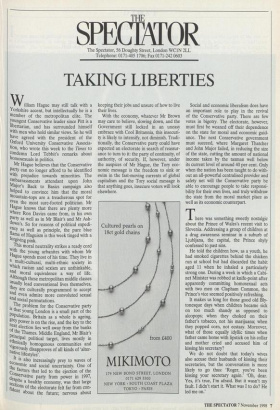The Spectator, 56 Doughty Street, London WC1N 2LL Telephone: 0171-405
1706; Fax 0171-242 0603
TAKING LIBERTIES
illiam Hague may still talk with a Yorkshire accent, but intellectually he is a member of the metropolitan elite. The Youngest Conservative leader since Pitt is a libertarian, and has surrounded himself With men who hold similar views. So he will have agreed with the president of the Oxford University Conservative Associa- tion, who wrote this week to the Times to Condemn Lord Tebbit's remarks about homosexuals in politics. Mr Hague believes that the Conservative Party can no longer afford to be identified With prejudice towards minorities. The embarrassments attendant upon John Major's Back to Basics campaign also helped to convince him that the moral mountain-tops are a treacherous spot for even the most sure-footed politician. Mr Hague knows that there are plenty more Where Ron Davies came from, in his own Party as well as in Mr Blair's and Mr Ash- down's. So for reasons of political expedi- ency as well as principle, the pure blue flame of Haguism is this week tinged with a forgiving pink. This moral neutrality strikes a ready cord with the young urbanites with whom Mr Hague spends most of his time. They live in a multi-cultural, multi-ethnic society in Which racism and sexism are unthinkable, and moral equivalence a way of life. Although these metropolitan middle classes usually lead conventional lives themselves, they are culturally programmed to accept and even admire more convoluted sexual and social permutations. . The problem for the Conservative party iS that young London is a small part of the Population. Britain as a whole is ageing, grey power is on the rise, and the key to the next election lies well away from the banks of the Thames. Middle England, Mr Blair's
Pflnei- pal political target, lives mostly in ve.thmcally homogenous communities and lgorously disapproves of all kinds of 'alter- native lifestyles'. _ It is also increasingly prey to waves of „emef'Dnomic and social uncertainty. One of c factors that led to the ejection of the , cIns.ervative party from power in 1997, espite a healthy economy, was that large rions of the electorate felt far from con- duent about the future; nervous about
keeping their jobs and unsure of how to live their lives.
With the economy, whatever Mr Brown may care to believe, slowing down, and the Government still locked in an uneasy embrace with Cool Britannia, this insecuri- ty is likely to intensify, not diminish. Tradi- tionally, the Conservative party could have expected an electorate in search of reassur- ance to turn to it: the party of continuity, of authority, of security. If, however, under the auspices of Mr Hague, the Tory eco- nomic message is the freedom to sink or swim in the fast-moving currents of global capitalism and the Tory social message is that anything goes, insecure voters will look elsewhere.
Social and economic liberalism does have an important role to play in the revival of the Conservative party. There are few votes in bigotry. The electorate, however, must first be weaned off their dependence on the state for moral and economic guid- ance. The next Conservative government must succeed, where Margaret Thatcher and John Major failed, in reducing the size of the state, cutting the amount of national income taken by the taxman well below its current level of around 40 per cent. Only when the nation has been taught to do with- out an all-powerful centralised provider and safety net will the Conservative party be able to encourage people to take responsi- bility for their own lives, and truly withdraw the state from the moral market place as well as its economic counterpart.
There was something sweetly nostalgic about the Prince of Wales's recent visit to Slovenia. Addressing a group of children at a drug awareness seminar in a suburb of Ljubljana, the capital, the Prince shyly confessed to past sins.
He told the children how, as a youth, he had smoked cigarettes behind the chicken run at school but had discarded the habit aged 11 when he inhaled a particularly strong one. During a week in which a Cabi- net Minister was robbed at knife-point after apparently committing homosexual acts with two men on Clapham Common, the Prince's vice seemed positively refreshing.
It makes us long for those good old Bly- tonesque days when children became sick on too much shandy as opposed to alcopops; when they choked on their father's tobacco, not his marijuana; when they popped corn, not ecstasy. Moreover, what of those equally idyllic times when father came home with lipstick on his collar and mother cried and accused him of kissing his secretary?
We do not doubt that today's wives also accuse their husbands of kissing their secretaries, but the conversation is more likely to go thus: 'Roger, you've been kissing your secretary again."Oh, dear. Yes, it's true, I'm afraid. But it wasn't my fault. I didn't start it. What was Ito do? He led me on.'


















































































 Previous page
Previous page